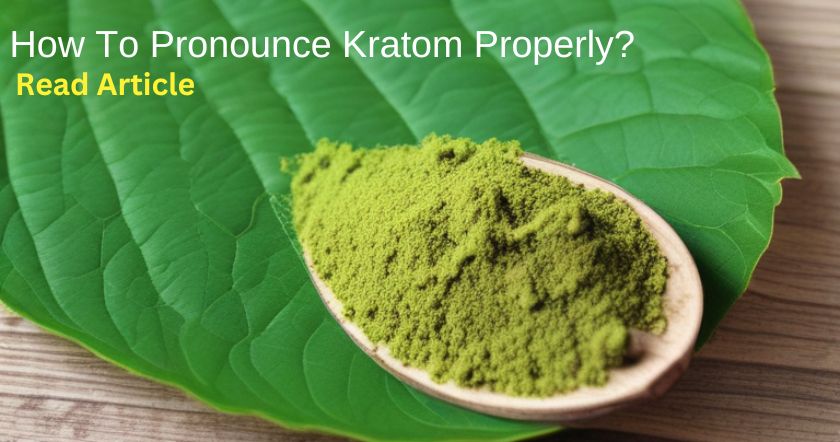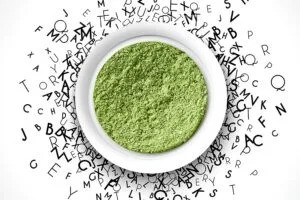Blog
How To Pronounce Kratom Properly? Complete Guide

Regarding the inquiry, “How do you pronounce Kratom properly?” There are several responses available. This adaptable plant, well-known for its possible uses, has generated discussions on its potential use and proper naming conventions. Let’s investigate the many pronunciations, their historical contexts, and the possibility of a clear solution to this linguistic conundrum.

Different Ways To Pronounce
The two most often used pronunciations for Kratom are “KRAT-um” and “KRAY-tum.” The Oxford Dictionary recognizes both ways to say the term, but there isn’t a set rule regarding which is correct.
KRAT-um
This is how Kratom is often pronounced in the first place. KRAT-um, a word that rhymes with “atom,” pronounces the letter “a” as short as opposed to long as “ay.”
This is a pretty typical method of pronouncing the word “as,” as most languages pronounce words with short “a” sounds instead of lengthy “ay” sounds.
KRAY-tum
This pronunciation, which rhymes with “Tatum,” substitutes the long “ay” sound for the short “a” sound in the word “a.” While many Americans pronounce the term this way by habit, this is by no means how most people pronounce it.
Which Is The “Right” One?
Pronunciation rules in English are intricate. It is practically hard to determine which pronunciation is “right” and which is “wrong” since there are so many exceptions. Although many other related terms hint that KRAT-um would be more appropriate, the basic principles would point to KRAY-tum.
The “a” sound is ultimately determined by regional accents, which results in a wide range of opinions over how to pronounce kratom.
While prominent advocacy groups like the American Kratom Association continue to use KRAY-tum when discussing the herb in their films and interviews, some veteran Kratom users maintain that KRAT-um is accurate. Does that imply that one is superior to the other in accuracy?
Another intriguing point to consider is that a lot of proponents of Kratom think that while pronouncing a plant’s name in English, one should consider how the plant is pronounced in its home country. Let’s examine the potential impact of it.
Tap to Access Wholesale Savings Today!
Southeast Asia
Locals refer to the drug as “ketum” in Southeast Asian nations where Bed Rock Kratom is grown; in many cases, especially in Thailand, the R is omitted from the pronunciation.
Depending on where you are, the drug even goes by several names; it is difficult to determine which pronunciation is most correct.
In Malaysia, it’s more popular to refer to it as ketum than in Thailand. It’s difficult to precisely Romanize the pronunciation in Thailand, where it’s more like kruh-tome.
What Is That?
The short answer is that Thai and Roman letters are not usually interchangeable. The “k” in kratom sounds in Thai like an unaspirated K, which in English is between a g and a k.
Despite this, the English pronunciation of kratom is almost often pronounced with a hard k.
In what sense, therefore, does this distinction matter? Is it realistic to argue that when speaking English, one must pronounce words according to their original tongue?
For native English speakers who are not familiar with Thai, Malay, or other regional languages, using the local pronunciations might be challenging even with knowledge of them.
Scientific Name
Even now, there are several ways to refer to Kratom that don’t even use the term. Mitragyna speciosa is the plant’s scientific name; nevertheless, it is also commonly shortened to M. speciosa. There are several names for this tropical plant, but they all relate to the same thing.
What then should we do?
Does Which One Is Used Matter?
When deciding how to pronounce a word, there isn’t a single accurate pronunciation that should be used as the standard. As was previously noted, the drug is already known by several names among people worldwide.
Furthermore, pronunciation will be greatly influenced by regional accents, as not all people will have had the opportunity to hear a word said aloud before attempting to pronounce it themselves.
There will be a lot of variety in the community on how the term is spoken because Kratom is a rather unusual chemical in the general public.
Does It Truly Matter Which One Is Used?
We believe that the answer is no. It is OK to pronounce a word differently than once as long as people understand what you are saying.
We don’t see anything intrinsically wrong with pronouncing it KRAY-tum, even though we lean toward KRAT-um since it is more in line with the pronunciation used in the areas where Kratom is cultivated (plus we love the way it sounds when combined with the term Kraken!).
Bigger Fish To Fry
In the end, there are more important things to worry about than the way to pronounce Kratom.
Although maintaining uniformity in the industry might help ensure that Kratom is consistently portrayed fairly, consumers are already used to the fact that different accents can affect a word’s pronunciation and that some individuals just say things in different ways.
Since Kratom doesn’t need to be regarded any differently from those terms, some modification is acceptable.
It would be preferable to spend your time promoting safe Kratom usage and industry safety measures rather than spending time criticizing people for pronouncing Kratom incorrectly.
An Interesting Fact
The terms “Kratom” are not recognized or included in either of the two main online dictionaries, Merriam-Webster and Oxford Learner’s Dictionary.
This is ridiculous. Send a furious email to the editors to express your disapproval of this crime against the Kratom community! Forward this information to them if they tell you they don’t know how to pronounce Kratom.
Final Words
Pronouncing words correctly is a minor but crucial part of having meaningful discussions regarding Kratom. Regarding their linguistic and cultural backgrounds, the roots of “KRAT-um” and “KRAT-tum” are distinct from one another. In the end, pronunciation is not as significant as the insights and opportunities that come with Kratom use. Recall that the secret to perfecting pronunciation is practice and regular application.
It may seem trivial, but it’s crucial to pronounce and spell Kratom properly. It’s acceptable to be scared because most individuals struggle to pronounce or spell Kratom correctly the first time. Nonetheless, mastering the correct pronunciation and spelling of Kratom may make it seem more approachable, eliminate some of the stigma, and provide you with a clearer understanding of where to go with this drug moving forward.
Speaking and understanding Kratom will improve if you pronounce the plant correctly, whether you’re purchasing a product, sharing information with people, or talking about its possible health advantages. Thus, exude confidence while pronouncing “Kratom,” and you’ll be well on your way to being an informed Kratom aficionado.